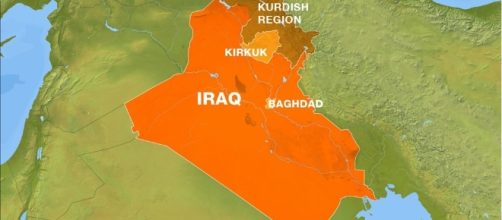Raqqa, the self-proclaimed capital of the Islamic Caliphate fell to US-backed Kurdish and Sunni Arab forces last week. Its liberation marked the end of Islamic State's three-year reign of terror over the citizens of Raqqa. A period defined by its brutality, in which it showcased its perverse interpretation of Islam propelling the region back to the medieval era. The world became accustomed to witnessing such atrocious acts of barbarism that made us sick to the stomach. Onlookers were forced to watch beheadings at football stadiums and also had to bear witness to homosexuals being hurled off rooftops in the busy town centre.
Western governments pushed for intervention but the appetite for another Middle-Eastern conflict wasn't there. The US and its allies could only muster military advisers and air strikes which only emboldened Isis, feeding its growth exponentially. The civil war in Syria has raged since 2011 and it has been left to those living in the area to pick up arms to defend their homes. The Kurdish Peshmerga have been on the front lines against Isis, most significantly defending its borders against Isis since 2014. The armed wing of the Syrian Kurdish Democratic Unity Party, known as the 'PYD', claims it alone has lost 3250 fighters as of January 2017, with thousands more Kurdish civilians dying in the crossfire and at the hands of suicide bombers.
The Kurdish Peshmerga have been instrumental in the battle against Isis. The kurds have stood their ground when other better equipped and financed forces such as the Iraqi army ran with their tails between their legs as in Mosul, where Isis took control of Iraq's second biggest city. The Kurds have long yearned for an independent state and after such sacrifice, it will be hard to imagine them giving up control of the land they defended to the Iraqi army, who chose to flee instead of fight.
What's preventing a Kurdish nation?
The Kurds are the fourth-largest ethnic group in the Middle East, although they have never obtained a permanent nation-state. Between 25 and 35 million Kurds inhabit the mountainous region straddling the borders of Turkey, Iraq, Syria, Iran and Armenia. There are strong independence movements in each of these countries, most prominently in Turkey, where Abdullah Ocalan established the PKK, whose main aim is an Independent Kurdish State in Turkey.
They have taken up arms against the government and since it was founded in 1978 more than 40,000 people have been killed. This explains Turkey's reluctance to help the Kurds in their fight against Isis and why they shelled a People's Protection Unit 'YPG' position in North-Western Syria which many thought aided Isis. Syrian Kurds share a distinctive community through a history of shared culture, race and language with the rest of the Kurds in the region. The idea of the creation of 'kurdistan' a homeland for the Kurds became prevalent in the early 20th century. After the defeat of the Ottoman Empire in World War One, the British government began to make provisions for a Kurdish state in 1920 through the Treaty of Sevres.
However, the Kurd's ambitions were overlooked in favour of the Treaty of Lausanne three years later. The Treaty of Lausanne granted Turkey considerably more land in a hope to maintain peace in the area, it outlines the borders of modern-day Turkey, leaving the Kurds as minorities in their respective countries.
Will we see a Kurdish state soon?
Weeks before Kurdish coalition forces stormed Raqqa in Eastern Syria, ousting Isis from the city, it held an independence referendum over 650km away in Kirkuk, Iraq. The motion gained a 93% endorsement among its Kurdish population but was not favourable among the city's Arab and Turkmen minorities. Ali Mehdi, the head of the Iraqi 'Turkmen Front' told CNN that many non-Kurds were being pressured into voting 'yes'.
Kirkuk has been a disputed area since the 1970s when the Iraqi government began settling Arabs and forcibly removing Kurds in an attempt to secure the oil-rich region. There is estimated to be over 8,000 million barrels of subterranean oil within the city limits. The Kurdish Peshmerga forces relied on the region to fund its war effort. The Kurds constructed a pipeline from Kirkuk to Turkey, allowing them to export up to 600,000 barrels of oil a day, to the outrage of Baghdad. The recent referendum forced the Iraqi army to act swiftly and forcibly occupy the city, out of fears that the independence vote might be implemented. The move highlights Baghdad's unwillingness to grant the Kurdish any land of their own, anytime soon.
Turkey seems similarly determined to crush any Kurdish independence movement with president Erdogan saying "We do not agree with the claim that Kirkuk is for Kurds at all, Kirkuk is for Turkmen, Arabs and Kurds if they are there. Do not enter into a claim it's yours, or the price will be heavy!"
What will the future hold for the Kurds?
Kurdish and Iraqi forces who had allied against Isis under the banner of the US have now turned against each other. The Turks and Iraqis have made it clear they will make no concessions to the Kurds and it is unlikely Iran, Armenia and Syria will either. The US was quick to come out and insist that despite the latest Iraqi move to take Kirkuk, that the lands they had "seized" were still disputed. But with the US no longer the universally accepted voice of authority in the region, the Kurds may have to fend for themselves, just as they had to do against Isis.


